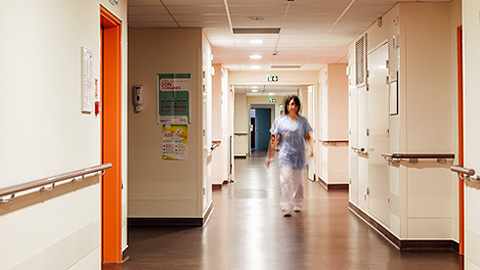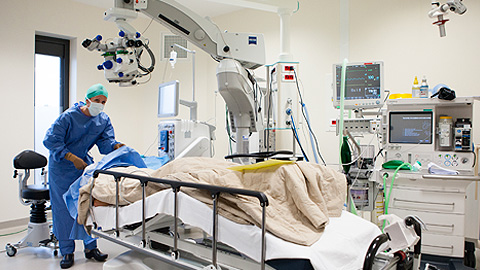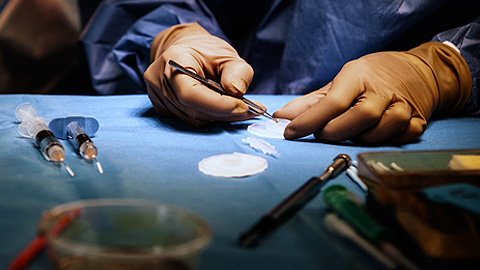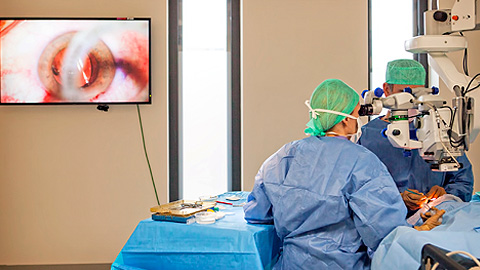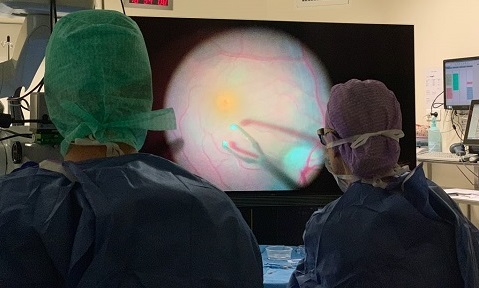Operations & Hospitalizations
CLINIQUE BEL-AIR
138, avenue de la République
33200 BORDEAUX
Disabled Access
Paid Parking
RECEPTION DESK
From Monday to Friday: 7 am to 7 pm
Saturday: 9 am to 12:30 pm / 1 pm
Sunday: 9 am to 12:30 pm / 3 pm to 6 pm
VISITING HOURS
Allowed from 1 pm to 8 pm
ACCESS BY BUS
Line 1 and 6 : bus stop « Bel-Air »
Line 41 : bus stop « Moulin Rouge »
CLINIQUE OPHTALMOLOGIQUE
ORL THIERS
144-148 Avenue Thiers
33200 BORDEAUX
Disabled Access
Car park reserved to the patients:
Rue de la Passerelle
RECEPTION DESK
From Monday to Friday: 8 am to 8 pm
Saturday: 9 am to 12 pm
Sunday: Closed
VISITING HOURS
Allowed from 1 pm to 8 pm
ACCESS BY TRAM
Line A: tram stop « Thiers-Benauge »
ACCESS BY BUS
Line 10 and 45: bus stop « Jardin botanique »
Procedures and instructions:
Pre-surgery procedures:
We recommend that you follow the following instructions:- Send a copy of your hospitalization form to your medical and/or surgical mutual fund and to your Social Security centre (only if the latter is based outside of the Gironde county), without forgetting to fill in your personal details.
- Book a meeting with one of our anaesthetist as soon as you have been confirmed the date of your operation. This appointment is for your mandatory pre-anaesthetic consultation, which will take place at the Clinique Bel Air.
-
After your consultation by anaesthetists, you must register for pre-admission at the Clinique BEL-AIR.
Information about the coverage of your treatment by your surgical mutual fund will be delivered during the registration process.
Do not forget to bring the following documents with you: social security and surgery mutual fund cards, results from biological or radiographic examinations linked to your treatment.
Pre-surgery instructions:
If you are to receive surgery operation, we highly recommend that you have a shower and wash your hair the morning of the day of the operation.Post-surgery instructions:
You have just undergone surger:We recommend that you carefully read the instructions below. If facing a problem, do not hesitate to contact us. After your operation, once you leave the clinic, follow the instructions given on your prescription form to the letter.
Post-surgery:
The post-surgery instructions and treatment will be given at the end of your procedure. The modalities of the post-operative control will also be specified there.
Standardized treatment is as follows:
It is perfectly normal that eyelids show some ecchymosis and that the white part of the eye looks a bit red. These traces of blood disappear within ten days. They are highly variable and patients might have more or less traces of blood in one eye or the other.
• After a cataract operation, you can wear your former prescription eye glasses. Your ophthalmologist will modify your correction usually three weeks after the intervention. Meanwhile, and if your former correction is causing you pain or trouble, your optician can equip you with neutral correction glasses.
• In some cases (surgery for retinal detachment, vitrectomy for macular hole) you will be asked to maintain a certain body position during the day and, in some cases, during the night. It is of the utmost importance to the success of your operation that you maintain this body position, as your eye will be partly or totally filled with a gas keeping your retina in place during the healing process. This gas will disappear within ten days. It is normal to notice a small ‘bubble’ floating horizontally in the inferior part of your visual field, ‘just like with builders’ level instruments’. This bubble might fragment into several smaller bubbles (‘like grapes’). This is perfectly normal and innocuous.
• Moderate pain and red patches are normal after an operation. However, if your eye is extremely inflated or very painful, or if it festers, you should call an emergency number. A serious eye infection is always possible after surgery and needs urgent treatment to be efficiently dealt with.
• How can I wash? : You can have a bath or shower as soon as you return home, so long as you avoid getting water into your eyes.
• What can/can’t I do? : Reading and writing are perfectly fine as soon as you return home. You can also watch television without any restrictions. Any significant physical effort as well as the practice of any sport are forbidden for one month. Your ophthalmologist will give you their authorization to have physical activity again. Walking is allowed as soon as you return home.
• Can I drive? : You may start to drive again with great care in the days or weeks following your operation, depending on your visual acuity and or general state of form, which will be both tested by your ophthalmologist and your GP.
As soon as you leave the clinic, take your control appointments with your regular ophthalmologist and with your surgeon, following their instructions.

 Book an appointment
Book an appointment